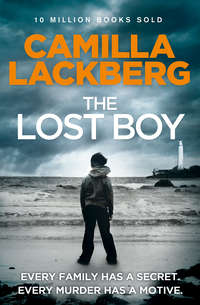
Полная версия
The Hidden Child
Axel’s cheerful, open expression shut down at once. ‘Fine,’ he said curtly. ‘It went fine.’ Then he turned on his heel. ‘I’m going to lie down again for a while. Please try to keep the noise level to a minimum, okay?’
Erik watched his brother go. Besides the awe and pride that he felt, there was also a certain amount of envy.
But Frans was filled with nothing but admiration. ‘Your brother is so courageous … I wish I could help too. If only I were a few years older.’
‘And what would you do then?’ asked Britta, still sulking because he’d ridiculed her in front of Axel. ‘You’d never dare. And what would your father say? From what I’ve heard, it’s the Germans he’d rather lend a helping hand to.’
‘Cut it out,’ said Frans crossly, shoving Britta off his lap. ‘People say so many things. I didn’t think you listened to crap like that.’
Erik, who always played the role of mediator in the group, abruptly stood up and said, ‘We can listen to my father’s records for a while, if you want. He has Count Basie.’
He hurried over to the gramophone to put on the record. He didn’t like it when people argued. He really didn’t.
CHAPTER 7

She’d always loved airports: the planes landing and taking off, the travellers with eyes full of anticipation as they set off on holiday or on a business trip, and all the coming and going, with people reuniting or saying their farewells. She remembered an airport from a long, long time ago. The crush of people, the smells, the colours, the hum of voices. The tension that she sensed rather than saw in her mother’s face and the way she held Paula’s hand in a tight grip. The suitcase that she’d packed and repacked and then packed again. Everything had to be right, because this was going to be a trip with no return. She remembered too the heat, and then the chill when they arrived. She would never have believed it possible to be so cold. And the airport where they landed was different. Quieter, with cold grey paint. No one spoke loudly, no one waved their hands around. Everybody seemed locked inside their own little bubbles. No one looked them in the eye. Their documents were stamped and then they were sent on their way by a strange-sounding voice in a strange-sounding language. And her mother had kept a tight grip on her hand the whole time.
‘Is that him?’ Martin pointed at a man in his eighties who had just exited the passport control area. He was tall, with grey hair, and he wore a beige trench coat. Very stylish, thought Paula immediately.
‘Let’s find out.’ She led the way. ‘Axel Frankel?’
The man nodded. ‘You’re from the police? I thought I was supposed to come and see you at the station.’ He looked tired.
‘We thought we might as well come out here to meet you.’ Martin gave him a friendly nod, introducing himself and his colleague.
‘I see. Well, in that case, I thank you for offering to give me a lift. I usually have to make do with public transport, so this will be a treat.’
‘Do you have a suitcase?’ Paula cast a glance at the luggage belt.
‘No, no, this is all I brought.’ He gestured towards the carry-on bag he was pulling behind him. ‘I always travel light.’
‘An art I’ve never mastered,’ said Paula with a laugh. The weariness on the man’s face vanished for a moment as he laughed too.
They chatted about the weather until they all got into the car and Martin began driving towards Fjällbacka.
‘Have you … have you found out anything more?’ Axel’s voice quavered and he had to stop talking in order to pull himself together.
Paula, who was sitting next to him on the back seat, shook her head. ‘No, unfortunately. We were hoping that you could help us. For example, we need to know whether your brother had any enemies. Is there anyone who might have wanted to harm him?’
Axel shook his head. ‘No, no, not really. My brother was the most peaceful and placid man, and … no, it’s absurd to think that anyone would want to harm Erik.’
‘What do you know about his involvement with a group called Sweden’s Friends?’ Martin tossed out the question from his place in the driver’s seat, meeting Axel’s eyes in the rear-view mirror.
‘So you’ve gone through Erik’s correspondence with Frans Ringholm.’ Axel rubbed the bridge of his nose before he said anything more. Paula and Martin waited patiently.
‘It’s a complicated story that started a very long time ago.’
‘We have plenty of time,’ said Paula, making it clear that she was expecting him to answer the question.
‘Frans is a childhood friend of mine and Erik’s. We’ve known each other all our lives. But … how should I put it? We chose one path and Frans chose another.’
‘Frans is a right-wing extremist?’ Again Martin met Axel’s gaze in the mirror.
Axel nodded. ‘Yes, I don’t really know in what way or to what extent, but all through his adult life he’s mixed in those circles, and he even helped to start that group called Sweden’s Friends. He probably picked up a lot of his views from home, although back when I knew him he never showed any such sympathies. But people change.’ Axel shook his head.
‘Why would this organization feel threatened by Erik? From what I understand, he wasn’t politically active. He was a historian specializing in the Second World War, right?’
Axel sighed. ‘It’s not that easy to remain neutral. You can’t research Nazism and at the same time remain, or be viewed as, apolitical. For instance, many neo-Nazi organizations dispute that the concentration camps existed, and all attempts to describe the camps and investigate what happened are regarded as a threat or an attack on their group. As I said, it’s complicated.’
‘What about your own involvement in the issue? Have you ever received any threats?’ Paula studied him closely.
‘Of course I have. To a much greater extent than Erik. My life’s mission has been working with the Simon Wiesenthal Center.’
‘And what exactly does the Center do?’ asked Martin.
‘The organization tracks down Nazis who have fled and gone underground. And it sees that they’re brought to justice,’ Paula explained.
Axel nodded. ‘That’s right, among other things. So yes, I’ve received my share of threats.’
‘Do you still have any of the actual letters?’ Martin asked.
‘The Center has them. Those of us who work for the Center send in any letters we get so they can be kept in the archives. If you contact them they’ll give you access to everything.’ He handed his business card to Paula, who put it in her jacket pocket.
‘And Sweden’s Friends? Have you received any threats from them?’
‘No … I don’t think so. No, not that I can recall. But as I said, you should check with the Center. They have everything.’
‘Frans Ringholm. How does he fit into the picture? You said he was a childhood friend?’ Martin enquired.
‘To be precise, he was Erik’s childhood friend. I was a couple of years older, so we didn’t really have the same circle of friends.’
‘But Erik knew Frans well?’ Paula’s brown eyes again studied Axel intently.
‘Yes, but that was ages ago. We’re going back sixty years here.’ Axel didn’t seem very comfortable with the topic of conversation. He kept shifting position on the back seat. ‘Even without dementia, the old memory starts to get a bit murky.’ He smiled wryly as he tapped his head.
‘But there’s been more recent contact, judging by the letters we found. Frans has been in touch with your brother repeatedly, at least by letter.’
Axel ran his hand through his hair in a gesture of frustration. ‘I’ve lived my life, and my brother has lived his. And it was only three years ago that we both settled in Fjällbacka permanently – well, semi-permanently, in my case. Erik had a flat in Göteborg during all the years he worked there, and I’ve spent my time more or less travelling around the world. Of course we’ve always had the house here as our base, and if anyone asks me where I live, I tell them Fjällbacka. But in the summertime I always flee to my flat in Paris. I can’t take all the hustle and bustle that comes with the tourists. For the most part we live a rather quiet and isolated life, my brother and I. The cleaning lady is the only one who ever visits us. We prefer … preferred it that way.’ Axel’s voice broke.
Paula caught Martin’s eye, and he shook his head slightly before returning his gaze to the motorway. Neither of them could think of anything else to ask. They spent the rest of the drive to Fjällbacka chatting tensely about trivial matters. Axel looked as if he might fall apart at any moment, and he seemed visibly relieved when they finally pulled up in front of his house.
‘Do you have any problem with … staying here now?’ Paula asked.
Axel stood in silence for a moment, his eyes fixed on the big white house, his carry-on bag in his hand. Finally he said:
‘No. This is my home, and Erik’s. We belong here. Both of us.’ He smiled sadly and shook hands with them before heading for the front door. To Paula, gazing after him, it seemed that he exuded loneliness.
‘So, did she rake you over the coals when you got home yesterday?’ Karin laughed as she pushed Ludde in his pushchair. She was walking at a brisk pace, and Patrik was panting with the effort of keeping up.
‘You might say that.’ He winced at the thought of the reception he’d had when he got home. Erica had not been in the sunniest mood. And to some extent, he could understand why. He was supposed to be taking responsibility for Maja during the daytime so that Erica could work. At the same time, he couldn’t help feeling that she’d overreacted. He hadn’t been out on some fun expedition; he was busy doing household errands. And how could he know that Maja wasn’t going to take her nap the way she usually did? It had seemed a bit unfair that he ended up in the doghouse for the rest of the day. But the good thing about Erica was that she never held a grudge for long, so this morning she’d given him a kiss, as usual, and the events of yesterday seemed forgotten. Although he hadn’t dared tell her that he was going to have company on his walk today. Of course he planned to tell her eventually; he was just putting it off for the moment. Even though Erica wasn’t a particularly jealous person, taking a walk with his ex-wife was not a subject that Patrik wanted to broach while he was already in the doghouse. As if Karin could read his mind, she said:
‘Is Erica okay with the idea that we spend time together? It’s years ago that we got divorced, but some people are a little more … sensitive.’
‘Sure, of course it’s okay,’ said Patrik, unwilling to admit to his cowardice. ‘It’s fine. Erica has no problem with it.’
‘That’s great. I mean, it’s nice to have company, but not if it causes problems on the home front.’
‘What about Leif?’ asked Patrik, eager to change the subject. He leaned over the pushchair to straighten his daughter’s cap, which was sitting askew. Maja didn’t pay any attention because she was fully occupied communicating with Ludde in the pushchair moving alongside her own.
‘Leif?’ Karin snorted. ‘You might say it’s a miracle that Ludde even knows who Leif is. He’s always out on the road.’
Patrik nodded sympathetically. Karin’s new husband was a singer with a dance band called Leffes. He could see how it might be a strain to be a dance band ‘widow’.
‘No serious problems between the two of you, I hope.’
‘No, we see each other too seldom for any problems to arise,’ replied Karin, laughing. But the laugh sounded bitter and hollow. Patrik sensed that she wasn’t telling the whole truth, and he didn’t know what to say. It felt a little strange to be discussing relationship problems with his ex-wife. Thankfully the ringing of his mobile saved him.
‘Patrik Hedström.’
‘Hi, it’s Pedersen. I’m ringing with the post-mortem results for Erik Frankel. We’ve faxed over the report, as usual, but I thought you’d want to hear the main points on the phone.’
‘Sure, of course,’ Patrik said hesitantly, casting a glance at Karin, who had slowed her pace to wait for him. ‘But the thing is, I’m actually on paternity leave at the moment.’
‘Is that right? Congratulations! Oh, you’ve got a wonderful time ahead of you. I stayed home for six months with both of my children, and those were the best months of my life.’
Patrik felt his jaw drop. He would never have believed that of the super-efficient, reserved, and rather cold medical examiner at the forensics lab. He suddenly pictured Pedersen, wearing his doctor’s lab coat, sitting in a sandbox where he was slowly and meticulously, with the greatest precision, making the perfect sand pies. Patrik couldn’t stop himself from laughing, which prompted a brusque ‘What’s so funny?’ in reply.
‘Nothing,’ said Patrik, as he motioned to Karin, who was looking surprised, that he’d explain later. ‘Would you mind giving me a brief summary?’ he went on in a more serious tone of voice. ‘I was at the crime scene the day before yesterday, and I’d like to keep up-to-date on what’s happening.’
‘Of course,’ said Pedersen, still sounding miffed. ‘It’s quite straightforward. Erik Frankel received a blow to the head from a heavy object. Probably something made of stone, because there are tiny fragments of stone in the wound, indicating that the substance in question had to be very porous. He died instantly since the blow struck him above his left temple and caused massive bleeding in the brain.’
‘Do you have any idea from which direction the blow was delivered? From behind? In front?’
‘In my opinion, the perpetrator was standing directly in front of the victim. And in all likelihood, the perp is right-handed. It’s more natural for someone who is right-handed to strike from the right. It would be extremely awkward for a left-handed person to do that.’
‘And the object that was used, any ideas as to what it might be?’ Patrik was aware of the eagerness in his own voice.
‘That’s for you to determine. A heavy object made of stone. Although it doesn’t look as if the victim’s skull was struck by any sort of sharp edge. The wound looks more like a contusion.’
‘Okay, that at least gives us a little to go on.’
‘Us?’ said Pedersen with a slightly sarcastic tone. ‘Didn’t you say you’re on paternity leave?’
‘Er, yes,’ said Patrik and paused for a second before he continued. ‘Well, I assume that you’ll ring the station and give them all the information.’
‘I supposed I’d better do that, under the circumstances,’ said Pedersen in amusement. ‘Shall I take the bull by the horns and ring Mellberg? Or do you have another suggestion?’
‘Martin,’ said Patrik instinctively, and Pedersen chuckled. ‘I’d already decided to do that, but thanks for the tip anyway. I’m surprised at you though: don’t you want to ask me when Frankel died?’
‘Oh, that’s right. When did he die?’ Patrik’s voice regained its eager tone. He cast another glance at Karin.
‘Impossible to say exactly. His body has been lying there in the heat for too long. But my best estimate is between two and three months ago. So that takes us to sometime in June or July.’
‘And you can’t be more specific than that?’ Patrik knew the answer to his question even before he asked it.
‘We’re not magicians over here. We have no crystal balls. June. That’s the best answer you’re going to get in this situation. I’m basing it partly on the type of flies that were found, partly on how many generations of flies and larva were present. Taking all of that into consideration, plus the body’s state of decay, I can say that he probably died in June. It’s your job to determine a more precise date of death. Or rather – it’s your colleagues’ job.’ Pedersen laughed.
Patrik couldn’t remember ever hearing him laugh before. And yet it had now happened several times during this phone conversation. All at Patrik’s expense. But maybe that’s what it took to get Pedersen to laugh. Patrik offered the usual words of thanks and then ended the call.
‘Work?’ Karin enquired.
‘Yes, an investigation that we’re doing at the moment.’
‘The old man who was found dead on Monday?’
‘I see that the gossip mill is as effective as ever,’ said Patrik. Karin had picked up the pace again, and he had to jog to catch up.
A red car passed them. After about a hundred metres, it slowed down, and the driver seemed to be glancing in the rear-view mirror. Then the car swiftly backed up, and Patrik swore to himself. Only now did he realize that the car belonged to his mother.
‘What’s this, are the two of you out for a walk together?’ asked Kristina. Having rolled down the window, she looked in surprise at Patrik and Karin.
‘Hi, Kristina! How nice to see you!’ Karin leaned towards the open window. ‘I’ve moved back to Fjällbacka and happened to run into Patrik. We discovered that we’re both on leave from our jobs and in need of company. I have a little boy named Ludvig.’ Karin pointed to the pushchair, and Kristina leaned forward, uttering the appropriate cooing sounds at the sight of the one-year-old.
‘Oh, how nice,’ said Kristina in a tone of voice that made Patrik’s stomach clench. Then a thought occurred to him that made his stomach hurt even more. Without wanting to know the answer, he asked his mother, ‘And where are you off to right now?’
‘I was on my way to your house. It’s been a while since I dropped by. I’ve brought some baked goods with me.’ She pointed happily to a bag of buns and sponge cake on the seat next to her.
‘Erica’s working …’ Patrik ventured lamely, but he knew it was pointless.
Kristina shifted into first gear. ‘That’s good. Then she’ll be happy to take a little coffee break. And you’ll be home soon too, won’t you?’ She waved to Maja, who merrily waved back.
‘Sure, of course,’ said Patrik, trying frantically to come up with a way to ask his mother not to mention who he’d been walking with. But his brain was completely blank, and in resignation he raised his hand to wave goodbye. With his stomach in knots, he watched his mother race off towards Sälvik. He was going to have to do quite a bit of explaining.
The work on her book was going well. She’d written four pages this morning, and now she stretched with satisfaction as she sat at her desk. Her anger from yesterday had faded, and in hindsight she thought that she might have overreacted. She would make it up to Patrik tonight by cooking something extra good for dinner. Before the wedding they’d both made an effort to lose a few pounds, but now they were back to their daily routines. And it was important to treat themselves once in a while. Maybe fillet of pork with gorgonzola sauce. Patrik liked that.
Erica stopped thinking about dinner and reached for her mother’s diaries. She really ought to sit down and read through all of them at once, but she just couldn’t bring herself to do that. She’d have to do it in small doses. Little glances into her mother’s world. She propped her feet up on the desk and began the laborious task of trying to decipher the old-fashioned, ornate handwriting. So far she’d mostly read about daily life in her mother’s home, the chores she’d helped out with, minor meditations about the future, their worry about Elsy’s father who spent all his time out at sea, even on the weekends. The descriptions of life were filled with the naïveté and innocence of a teenager, and Erica had a hard time associating the girlish voice evident in the text with the mother she remembered. She had seemed so remote, so stern and forbidding; Erica and Anna had never known her to speak a tender word or display any affection for them.
After reading partway down the second page, Erica suddenly sat up straight. A familiar name had appeared. Or rather, two names. Elsy wrote that she’d been over to Erik and Axel’s house while their parents were away. The text was mostly a lyrical description of their father’s library, which had impressed Elsy enormously, but Erica saw only the two names: Erik and Axel. It had to be Erik and Axel Frankel. Eagerly she read through the whole passage about the visit, realizing from the tone that they must have spent a lot of time together, Elsy and Erik, and two other youths named Britta and Frans. Erica searched her memory. No, she’d never heard her mother mention any of them. She was quite sure about that. And Axel was depicted in Elsy’s diary as almost a mythical, heroic figure. Elsy described him as ‘infinitely brave, and nearly as stylish as Errol Flynn’. Had her mother been in love with Axel Frankel? No, that wasn’t the feeling Erica got from reading her words; it was more as if Elsy had harboured a deep admiration for him.
Erica set the diary on her lap as she brooded over what she’d just read. Why hadn’t Erik Frankel mentioned that he’d known her mother when they were young? Erica had told him where she’d found the Nazi medal, and who it had belonged to. Yet he hadn’t said a word. Again Erica recalled the strange silence that had ensued. She was right. There was something that he’d been keeping from her.
The shrill sound of the doorbell interrupted her thoughts. With a sigh she swung her legs down from the desk and pushed back her chair. Who could that be? Her question was immediately answered by someone calling ‘Hello?’ in the hall. Erica sighed again, now with even greater emphasis. Kristina. Her mother-in-law. She took a deep breath, opened the door, and went over to the staircase. ‘Hello?’ she heard again, the tone of voice even more insistent, and Erica felt herself clenching her jaw with annoyance.
‘Hello,’ she said, as cheerfully as she could manage, although she was aware how false it sounded. Thank goodness Kristina was not particularly attuned to nuances.
‘Just popped into say hello!’ replied her mother-in-law happily as she hung up her jacket. ‘I brought along some cookies for coffee. Baked them myself. Thought you’d appreciate it, since you career girls don’t have time for such things.’
Erica was gnashing her teeth. Kristina had an unbelievable talent for issuing veiled criticisms. Was she born that way or was it something she’d perfected through long years of practice?
‘Oh, that sounds nice,’ she said politely as she went into the kitchen where Kristina was already making coffee, as if it were her house and not Erica’s.
‘Sit down. I’ll fix the coffee,’ she said. ‘I know where everything is.’
‘You certainly do,’ said Erica, knowing that Kristina wouldn’t pick up on the sarcasm.
‘Patrik and Maja are out taking a walk. They probably won’t be back for a while,’ she said, hoping that might make her mother-in-law cut her visit short.
‘I know,’ said Kristina as she measured out scoops of coffee. ‘Two, three, four …’ She put the scoop back in the tin and then turned her attention to Erica. ‘They’ll be home any minute. I drove past them on the way over. It’s so nice that Karin has moved back, and that Patrik has some company in the daytime. It’s boring to go out walking all alone, especially for someone like Patrik, who’s used to working and being productive. It looked as though they were enjoying each other’s company.’
Struggling to process this information, Erica stared at Kristina. What was she on about? Karin? Karin who?
The moment Patrik stepped through the door, a light went on in Erica’s head. Oh, that Karin.
Patrik smiled sheepishly, and after a strained pause he said, ‘How nice – coffee.’
They’d gathered in the kitchen for a run-through of the case. It was getting close to lunchtime, and Mellberg’s stomach was growling loudly.
‘Okay then, what do we have so far?’ He reached for one of the buns that Annika had set out on a platter. Just a little appetizer before lunch. ‘Paula and Martin? You talked to the victim’s brother this morning – did you find out anything interesting?’ He chewed on the bun as he talked, dropping crumbs on to the table.
‘That’s right, we picked him up at Landvetter airport,’ said Paula. ‘But he doesn’t seem to know very much. We asked him about the letters from Sweden’s Friends, but the only thing he was able to clarify was that Frans Ringholm was apparently one of Erik’s childhood friends. Axel didn’t know about any specific threats from that organization; it seems that threats were something of an occupational hazard, given the work that he and Erik did.’









